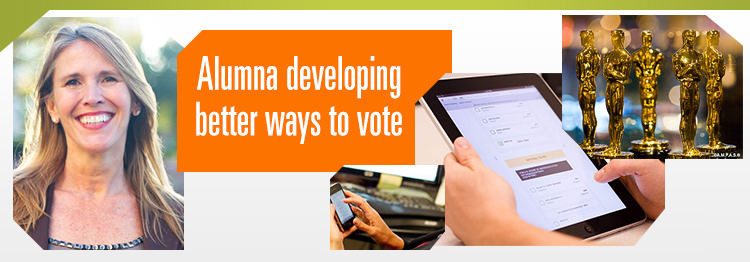Alumna developing better ways to vote
Lori Steele '86 trusted by Oscars, various states for web-based voting systems

When the unlikely results of a recall election turned a movie star into California governor in 2003, BGSU alumna Lori Steele ’86 recognized a business opportunity that changed her career. She is founder, Chairman and CEO of Everyone Counts, a company that develops software for balloting and has facilitated web-based elections around the world.
Though most often the company deals with governments and has led the city of Chicago and states of Utah, Oregon and Colorado, among others, to streamline their election processes, Everyone Counts is now earning widespread attention with their latest high-profile client: The Academy of Motion Picture Arts and Sciences.
Until contracting with Everyone Counts in 2011, the Academy’s approximately 6,000 voting members submitted their Oscar picks by mail. The 85th Academy Awards held Sunday, February 24 represents the first year that her company has operated nominations, followed by two weeks of online voting for finals in preparation for the program.
Steele was impressed by the amount of research the Academy performed before implementing their first online voting system with Everyone Counts.
“The Academy cares a lot about the integrity of their elections,” Steele said. “The Academy is taking great care to make sure they have the best voting system on the planet. They have performed more testing and auditing than most governments do to prepare for an election, and governments go through a lot of testing.”
As a student at BGSU, Steele expected that her psychology major would shape her career. Instead, it was a job as a receptionist at an investment brokerage in San Diego during a year she took off from studies
“It would likely take all the supercomputers in the world a year to break into a single one of our ballots”“Being around professionals who were constantly thinking about the intricacies of business and the financial markets, and using that data to make investment decisions was fascinating to me. I was intrigued by the mechanics of the economic system,” she said. “But that is not what I expected to be doing for a living.”
She changed her major to business, and returned to the firm as an executive assistant after graduating from BGSU. She moved up the corporate ladder, ultimately earning an industry reputation as an expert in technology and finance.
Steele was presenting at the International Telecom Union’s World Telecom conference held by the United Nations in Switzerland in 2003, when discussions went off topic to the California recall election that installed Arnold Schwarzenegger as governor. The recall and subsequent election was estimated to cost $70 million after the former governor, Gray Davis, was accused of mismanaging state funds and putting California more than $30 billion in debt. Many conference attendees were simply surprised than an Austrian bodybuilder could become head of an American state, but it was the discussions about the bureaucratic obstacles and expense of election operations that struck Steele.
“I thought, ‘Wow, no State of the Art technologies or business processes are applied to elections,’” Steele recalled. “No other industry would put up with that mediocrity. ”
Steele ultimately acquired an Australian voting company and found ways to further their reputation for security and transparency.
Though critics often suggest that hackers could easily corrupt a web-based election, Steele insists that her company uses military-grade security measures and that the best techniques for online voting are safe and easily auditable.
“One of the things I hate the most in the world is (justifying a bad idea) by saying, ‘We do it this way because that’s how its always been done.’”Many of the most widely publicized challenges in online voting have been overcome. In 2004, the Pentagon temporarily abandoned the SERVE initiative that first experimented with online voting for military, after a university faculty member lead a team of students to identify weaknesses in the system by hacking into it. Five years later, the online voting program was secure enough to include all Americans living abroad.
Today, there are more inherent security risks in using hardware-based systems, such as voting machines, Steele said.
“It would likely take all the supercomputers in the world a year to break into a single one of our ballots,” Steele said.
In 2011, the state of Oregon hired Everyone Counts to develop software for iPads to be used by disabled voters, Steele said. Disabled voters were visited at their homes by poll workers armed with the devices, rather than be required to travel to their polling locations.
Steele’s business is booming, and online elections are absolutely the future of voting for governments and private organizations worldwide, she said.
“If you get all of the smart people in the world in a room and asked them to come up with the very best way to hold a secure and accessible election, and someone said, ‘Let’s print thousands of different ballots on paper, send them to garages around the city, make people wait in line at their neighbor’s house to mark that piece of paper, put them in a cardboard box, drive them across town, and then count them by hand,’ that person would be laughed out of the room. But that is the way (voting) is done today,” Steele said.
“One of the things I hate the most in the world is (justifying a bad idea) by saying, ‘We do it this way because that’s how its always been done.’”
Steele encourages BGSU students majoring in political science or marketing to apply for internships and co-ops in San Diego at Everyone Counts. For more information, visit everyonecounts.com. ###
Updated: 12/02/2017 12:53AM
